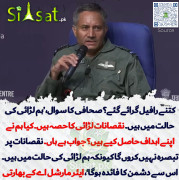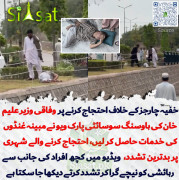Pashtunwali or Pakhtunwali is a non-written ethical code and traditional lifestyle which the indigenous Pashtun people from Afghanistan and Pakistan follow.
There are nine main principles of Pashtunwali. Although Pashtunwali is believed to date back to the pre-Islamic period, its usage or practice does not contravene basic Islamic principles.
Melmastia (hospitality) -
Showing hospitality and profound respect to all visitors, regardless of distinctions of race, religion, national affiliation as well as economic status and doing so without any hope of remuneration or favour. Pashtuns will go to great extents to show their hospitality.
Nanawatai (asylum) -
Derived from the verb meaning to go in, this is used for protection given to a person who requests protection against his/her enemies. The people are protected at all costs, in many cases even people running from the law must be given refuge until the situation is clarified.
Badal (justice) -
To seek justice against the wrongdoer. This applies to injustices committed yesterday or 1000 years ago if the wrongdoer still exists.
Tureh (bravery) -
A Pashtun must defend his land/property, family and women from incursions wherever he or she might reside. A Pashtun should always stand brave against tyranny and he should always be able to defend his property, family, women and the honour of his name.
Sabat (loyalty) -
Loyalty must be paid to ones family, friends, and tribe members. Loyalty is a must and a Pashtun can never become disloyal as this would be utterly shameful towards themselves and their families.
Imandari (righteousness) -
A Pashtun must always strive towards thinking good thoughts, speaking good words and doing other good deeds. Pashtuns must behave respectfully towards all creations including people, animals and the environment around them. Pollution of the environment or its destruction is against the Pashtunwali.
Isteqamat -
Trust in God. The notion of trusting in the one Creator generally comports to Islamic idea of belief in only one God.
Ghayrat (self honour or dignity) -
Pashtuns must maintain their human dignity. Honour has great importance in Pashtun society and most other codes of life are aimed towards the preservation of ones honour or pride. They must respect themselves and others in order to be able to do so, especially those they do not know. Respect begins at home, among family members and relatives.
Namus (Honor of women) -
A Pashtun must defend the honor of Pashtun women at all costs and must protect them from vocal and physical harm.

There are nine main principles of Pashtunwali. Although Pashtunwali is believed to date back to the pre-Islamic period, its usage or practice does not contravene basic Islamic principles.
Melmastia (hospitality) -
Showing hospitality and profound respect to all visitors, regardless of distinctions of race, religion, national affiliation as well as economic status and doing so without any hope of remuneration or favour. Pashtuns will go to great extents to show their hospitality.
Nanawatai (asylum) -
Derived from the verb meaning to go in, this is used for protection given to a person who requests protection against his/her enemies. The people are protected at all costs, in many cases even people running from the law must be given refuge until the situation is clarified.
Badal (justice) -
To seek justice against the wrongdoer. This applies to injustices committed yesterday or 1000 years ago if the wrongdoer still exists.
Tureh (bravery) -
A Pashtun must defend his land/property, family and women from incursions wherever he or she might reside. A Pashtun should always stand brave against tyranny and he should always be able to defend his property, family, women and the honour of his name.
Sabat (loyalty) -
Loyalty must be paid to ones family, friends, and tribe members. Loyalty is a must and a Pashtun can never become disloyal as this would be utterly shameful towards themselves and their families.
Imandari (righteousness) -
A Pashtun must always strive towards thinking good thoughts, speaking good words and doing other good deeds. Pashtuns must behave respectfully towards all creations including people, animals and the environment around them. Pollution of the environment or its destruction is against the Pashtunwali.
Isteqamat -
Trust in God. The notion of trusting in the one Creator generally comports to Islamic idea of belief in only one God.
Ghayrat (self honour or dignity) -
Pashtuns must maintain their human dignity. Honour has great importance in Pashtun society and most other codes of life are aimed towards the preservation of ones honour or pride. They must respect themselves and others in order to be able to do so, especially those they do not know. Respect begins at home, among family members and relatives.
Namus (Honor of women) -
A Pashtun must defend the honor of Pashtun women at all costs and must protect them from vocal and physical harm.





























